|
In the Energy News Beat - Conversation in Energy with Stuart Turley, Dr. Vance Ginn is interviewed about various pressing economic and political issues. They discuss the recent presidential debate, the state of the U.S. economy, the implications of red-state policies on job growth, and the impact of high energy costs on inflation. The conversation also covers the importance of school choice, immigration reform, Supreme Court rulings on free speech, the Chevron Supreme deference Court decision on regulatory issues, and the challenges of achieving net zero emissions amidst global economic shifts. Dr. Ginn emphasizes the need for sound financial policies and reducing government spending.
Please follow Vance on his substack HERE: https://vanceginn.substack.com/. It is a great source of finance and political insights. Vance, I would like to have you back and on the 3 Podcasters Walk into a Bar with David Blackmon and Rey Trevio. - Thanks again for your time, and talk soon - Stu
0 Comments
Pros and Cons of Using a Home Equity Line of Credit to Pay Off Your Mortgage: Interview on NTD News5/22/2024 With house prices surging recently, the average American homeowner now has around $300,000 of equity in their home. With the cost of living also soaring, many homeowners are considering taking out a home equity loan, or HELOC, to pay off their mortgage. But how exactly do such lines of credit work, and are they a good idea?
NTD’s Evelyn Li spoke with Vance Ginn, the former chief economist at the White House’s Office of Management and Budget and the president of Ginn Economic Consulting, to find out more. Interview on NTD News on May 22, 2024: https://www.ntd.com/pros-and-cons-of-using-a-home-equity-line-of-credit-to-pay-off-your-mortgage-economic-consultant_994520.html Did The Supreme Court Just Give The CFPB Too Much Power - Radio Interview on Lars Larson Show5/22/2024 Watch interview at NTD News.
Vance Ginn, president of Ginn Economic Consulting and former chief economist for the White House Office of Management and Budget, offers his analysis of the latest U.S.-China policy after the Biden administration recently announced a 100 percent tariff on Chinese electric vehicles. Listen to the interview with Sean Hannity here.
Vance Ginn, former Chief Economist for the OMB, currently founder and president of Ginn Economic Consulting and host of the Let People Prosper Podcast and EJ Antoni, a Public Finance Economist at the Heritage Foundation, discuss Biden’s dismal economy. Just yesterday while speaking in Wisconsin, Biden did everything he could to convince the audience that things are actually going really well. My Interview of Dr. Deane Waldman: Fireside Chat on Why Price Transparency Won’t Work (But could...)5/3/2024 Watch this interview that I did with Dr. Deane Waldman on the costs and benefits of mandating price transparency by hospitals and whether it will result in anything productive at the Third National Health Care Transparency & No Surprise Act Summit, This interview was aired at https://www.hctransparencysummit.com/.
The Federal Trade Commission (FTC) is getting sued by the Chamber of Commerce and several business groups over banning non-compete agreements. They usually prevent a person from working in the same industry or starting a competing business for some time after leaving a job. The FTC calls these agreements unfair, but some say the contracts protect trade secrets and encourage competitiveness. The rule is to take effect in August.
For insight, NTD’s David Lam spoke with Vance Ginn, president of Ginn Economic Consulting. Mr. Ginn also served as chief economist for the White House Office of Management and Budget. Originally aired on NTD News and posted here. On this episode of Future of Freedom, host Scot Bertram is joined by two guests with different viewpoints regarding possible reforms to the Supplemental Nutrition Assistance Program (SNAP). First on the show is Vance Ginn, president of Ginn Economic Consulting and former chief economist at the White House Office of Management and Budget. Later, we hear from Angela Rachidi, senior fellow and Rowe Scholar at the American Enterprise Institute. You can find Vance on X, formerly Twitter, at @VanceGinn and Angela at @AngelaRachidi.
Originally published by America's Talking Network. Interview on Fox 5 in DC.
The economy added 303,000 new jobs in March, a number that President Biden touts as a sign his policies are working. What does this mean for inflation, and interest rates? Jim breaks it down with economist and former White House associate OMB director Vance Ginn on The Final 5. Originally published at Freedom Conservatism.
Vance Ginn is the founder and president of Ginn Economic Consulting and host of the “Let People Prosper Show.” A FreeCon signatory and former associate director for economic policy at the U.S. Office of Management and Budget, Ginn currently serves as senior fellow at Americans for Tax Reform, associate research fellow at the American Institute for Economic Research, and chief economist at the Pelican Institute for Public Policy. In a recent AIER commentary, he critiqued President Biden’s proposed federal tax on unrealized capital gains and similar proposals from progressive-led state governments. Such a tax “should be rejected,” Ginn wrote, “as it is fundamentally unjust, likely unconstitutional, and would hinder prosperity and individual freedom.” “A tax on unrealized capital gains means that individuals are penalized for owning appreciating assets, regardless of whether they have realized any actual income from selling them.” He argued that a better way to help disadvantaged Americans would be to reduce their tax burdens and reform regulations to spur more economic innovation and job creation. In a separate piece in Law & Liberty, Ginn recommended the application of two rules to federal policymakers: a cap on annual spending growth and a disciplined approach to monetary policy. “Proper constraints will nudge even the worst politicians to make fiscally responsible choices and reduce net interest costs. Furthermore, America will be better positioned to respond to crises at home and abroad.” Originally this article with my quotes ran by KTRH News in Houston.
Under the Presidency of Woodrow Wilson in 1913, the Federal Reserve was born. The goal of it was simple, to help avert depressions and inflation, while preventing wealthy Americans from controlling financial markets at lower class expense. For the majority of its lifespan, it has sat mostly unimpactful, until the 1980s. With inflation raging out of control, then-Fed Reserve Chairman Paul Volker gave us tough love, and raised the rates along with restricting the money supply. This led to some hard time initially, especially within the first 6 months, but it eventually helped quell inflationary pressures on the economy, and we transitioned into the economic prosperity of the Ronald Reagan days. But in the last two decades, the Fed has gradually sought to destroy the American dollar, releasing endless money into the economy all while their balance sheet balloons to outrageous levels. It has culminated now in lower-to-middle class Americans struggling to make ends meet and buy basic necessities. Economist Vance Ginn says the many 'band aids' that the Fed has put on the economy, like monetizing debt, have hurt Americans more than ever. "Everyone's cost of living has dramatically increased...and the Fed has directly contributed to that by how much they have manipulated interest rates through their balance sheet, and by increasing the money supply," he says. For the longest time, the Fed kept interest rates has artificially kept he rates low to finance the dramatic government overspending. Then when the pandemic hit in 2020, the Fed created trillions to give away in stimulus checks, and to try and boost the economy, which has now essentially ruined it. As mentioned above, the old chairman Paul Volker's ways were about creating a brighter long-term future, instead of short-term fixes. That, according to Ginn, is what we desperately need again. "We need that style...he used to dramatically cut the money supply, which helped heal the pressures on the economy...so far, current Chairman Jerome Powell has not wanted to do that," he says. "Sometimes you need to have short term pains for long term gains." Current chairman Jerome Powell was a Donald Trump appointee, but the former President has since grown weary of Powell, criticizing him more and more. Trump has made a living on the campaign trail bashing the Biden economy, which he has vowed to fix if he wins office again. But to fix the situation might mean taking a hard look at Powell, and potentially replacing him. "We need someone who understand the economy, and the influence the Fed has on our lives," he says. "We need to make sure there is a sustainable path forward...that will be pivotal for the first part of a Trump Administration in 2025." As for who Trump would tab as a new Chairman is anyone's guess. But the parameters for what is needed are there. "In order to have the Fed come in and make those needed major changes...you have to give someone the leeway to do that, whether Trump like it or not," Ginn says. Trump would very much not like having to cause financial pain for Americans, considering how much he prides himself on winning at all costs. But he may not have a choice. "I think he will be able to sell it to the people though...he can just blame it on Biden," he says. But until then, as with just about every other aspect of our lives, the Biden Administration will continue keeping their thumb down on lower to middle class Americans. In the wake of the Baltimore bridge collapse, a major U.S. port has come to a standstill. The Port of Baltimore is the top U.S. port for vehicle imports and exports, as well as for farm and construction machinery. U.S. Transportation Secretary Pete Buttigieg told MSNBC on Wednesday that while there are many ports on the U.S. East Coast, “there is no substitute for the Port of Baltimore being up and running.”
How will this affect the U.S. economy—and even global supply chains? NTD spoke to Vance Ginn, the president of Ginn Economic Consulting and the former chief economist at the U.S. Office of Management and Budget, to find out more. Could Colorado become one of the seven states with no income tax? Vance Ginn, former White House Office of Management and Budget, believes the state is on the #Path2Zero.
Check out the highlights from my recent segment on Fox Business. Former Office of Management and Budget chief economist Vance Ginn and Slatestone Wealth chief market strategist Kenny Polcari analyze how the Middle East conflict and House speaker standstill impact markets.
Full segment on Fox Business here. Interview: Could The Biden Admin’s Antitrust Crusade Against Big Tech End Up Hurting Consumers?9/21/2023 President Joe Biden’s administration has targeted Big Tech with several antitrust enforcement actions that could significantly impact consumers, but while many conservatives support the efforts, others fear they may stifle innovation.
Under Biden, the Department of Justice (DOJ) is presently engaged in a lawsuit against Google, the Federal Trade Commission (FTC) took Meta to court, and there is a possibility of a forthcoming lawsuit against Amazon, all over alleged antitrust violations stemming from industry monopolies. Some conservatives say this enforcement will increase competition, but others say the increase in government intervention in business will harm consumers while also reducing innovation. “Generally, antitrust enforcement is intended to help consumers by deterring anticompetitive conduct that would lead to higher prices, lower quality service, and fewer choices for consumers,” Hudson Institute Senior Fellow and former FCC Commissioner Harold Furchtgott-Roth told the DCNF. “DOJ must explain to the judge how Google’s contracts for search engines harm consumers. Based on public information, I am not sure how DOJ makes that case.” The DOJ originally filed an antitrust lawsuit against Google under the Trump administration, in October 2020, alleging the company used unlawful practices to maintain a monopoly in the search and search advertising markets. In particular, the lawsuit alleges that Google has abused its dominant market position to force its search engine as the default on web browsers. “Google’s contracts ensure that rivals cannot match the search quality ad monetisation, especially on phones,” the DOJ alleges. “Through this feedback loop, this wheel has been turning for more than 12 years. It always turns to Google’s advantage.” Though the Biden administration did not initiate antitrust cases against Facebook and Google, since Biden took office his administration has expanded antitrust enforcement against tech companies, with the FTC under Biden appointee Lina Khan suing Microsoft over its Activision acquisition and refiling a lawsuit against Facebook. Biden has also made antitrust reform a key part of his economic platform, calling for passing “bipartisan legislation to strengthen antitrust enforcement and prevent big online platforms from giving their own products an unfair advantage” in his February State of the Union address. Some economists argue, however, that this strategy disincentivizes innovation by creating greater regulatory friction for companies looking to expand. Moreover, experts question whether large tech companies’ market positions actually hurts consumers, as many of their products, such as Facebook and Google search, are free to use and provide numerous benefits. There are also many other search engines that are available to use. “This administration has used [antitrust] to go after businesses based on subjective grounds,” Pelican Institute for Public Policy chief economist Vance Ginn told the DCNF. “The consequences … are a growing reliance on lawyers instead of expanding their businesses that people are choosing to use even with competitors in the search engine market. Doing so, the administration is making it more costly for new businesses to enter the market because of legal liability and dealing with a radical antitrust policy environment.” Google referred the DCNF to a blog post titled, “People use Google because it’s helpful,” highlighting the quality of its product and the fact that it is free of charge. (RELATED: DAVIS: Why Conservatives Must Support The DOJ Against Google). Despite these concerns, many Republicans and conservatives have joined with Biden in advocating for stronger antitrust enforcement and legislation targeting tech companies’ market dominance. Prominent GOP lawmakers including Iowa Sen. Chuck Grassley, Arkansas Sen. Tom Cotton and Colorado Rep. Ken Buck all backed legislation intended to target major tech companies. Many conservatives also argue that stricter antitrust enforcement could ameliorate the problem of online censorship. “Big Tech has had a stranglehold on the online marketplace of ideas for far too long,” founder and President of the Internet Accountability Project Mike Davis told the DCNF. “Consumers, especially those on the right, have had their opinions and voices silenced by the speech censors of Big Tech. Breaking up those behemoths will not only allow for more freedom of expression online, but it would allow a new era of discourse to flourish. Competition is important for all Americans, not just conservatives. Antitrust should be a nonpartisan issue as American as apple pie.” Jake Denton, a research associate at the Heritage Foundation’s Tech Policy Center, asserts that government intervention is necessary to prevent this. “The unchecked growth of Big Tech monopolies has gone on for too long,” Denton told the DCNF. “Silicon Valley giants like Google, Amazon, Facebook and Apple have been steadily acquiring emerging startups and growing competitors, consolidating their control over the tech sector … It is no longer tenable for regulators or our lawmakers to remain on the sidelines.” The Biden administration has recently signaled its willingness to expand its crackdown on tech companies, with the FTC charging Amazon in June for allegedly having “duped millions of consumers into unknowingly enrolling in Amazon Prime,” according to its complaint. It also claims it takes at least six clicks to cancel a Prime membership. “Consumers could lose out on popular features like Google Maps being at the top of search results, Amazon’s Prime program, or iPhones that come ready to use with basic apps out of the box,” Cato Institute Technology Policy Research Fellow Jennifer Huddleston told the DCNF. “The shift towards a ‘big is bad’ mentality could penalize companies for developing features that make them more popular than competitors or otherwise improve their product” Huddleston told the DCNF. The White House referred the DCNF to speeches and studies conducted by the administration asserting that antitrust enforcement boosts economic activity and competition. The DOJ did not respond to the Daily Caller News Foundation’s request for comment. The FTC declined to comment. Originally posted at Daily Caller. PMorgan Chase CEO Jamie Dimon says Americans would be making a “huge mistake” if they believe narratives saying the U.S. economy is booming.
NTD spoke to Vance Ginn, the president of Ginn Economic Consulting and former Chief economist at the Office of Management and Budget, on some ideas to kickstart the economy. Ginn says he agrees with Dimon’s statement, citing increasing inflationary pressures and inflation-adjusted spending being basically flat. Watch my full interview on NTD News here. (The Center Square) – The property tax relief package passed by the state Legislature is the second largest in Texas history, economist Vance Ginn, president of Austin-based Ginn Economic Consulting, says.
While at the Texas Public Policy Foundation, Ginn helped devise a plan to eliminate one of multiple property taxes homeowners pay: the school maintenance and operations (M&O) tax. Eliminating this tax over time was part of Gov. Greg Abbott’s call for the first and second special legislative sessions. Ginn, who sat down with The Center Square to explain differing property tax relief approaches, was also integral to implementing federal tax reform efforts when he worked at the White House’s Office of Management and Budget under the Trump administration. After the legislature passed an $18 billion property tax relief package Thursday, House Speaker Dade Phelan said it was “the largest cut in Texas history.” Lt. Gov. Dan Patrick said it was “the largest property tax relief package in Texas history, and likely the world.” Abbott, when running for reelection for his third term, vowed to return half of the state’s record $33 billion surplus to taxpayers. On Wednesday, he said the package allocated “at least $13.5 billion from our historic budget surplus to provide substantial relief to property taxpayers across Texas.” With additional money from the budget, he said they were delivering “over $18 billion in property tax cuts.” According to Ginn’s analysis, the package includes $12.7 billion in new relief and $5.3 billion from the earlier-approved state budget. Neither $13.5 billion nor $12.7 billion is half of the surplus, he points out. The combined $18 billion in property tax cuts, Ginn also points out, isn’t the largest property tax cut in state history. That occurred under Gov. Rick Perry in the 2008-2009 legislative session when the legislature passed $14.2 billion in property tax relief, he said. In order to surpass that, adjusting for inflation, “for us to have the same purchasing power of those dollars back then it would need to be about $21 billion,” he said. “This isn't the largest tax cut in history. It's substantial, it's historic, probably the second most ever.” But more problematic, he says, is the Republican-led legislature spent more money than ever before. “This session was the largest spending increase in Texas history of more than 20%,” he said. “If you look at all funds, and more than 30% if you look at state funds, the state's portion is up by a massive 30%. More than $50 billion being spent; that’s more than ever before. “If you spend too much, you can't provide as much in tax relief. That's just dollars coming from the taxpayers.” The $33 billion surplus means the state over collected taxes, he added. “That should be returned to the taxpayer. And the best way to do that,” through property tax reduction, “is through compression.” “The research that I've done on this in the past is that's the only way you can get to zero. If we really want to eliminate property taxes, which is what Governor Greg Abbott said he wants to do, you can't do it by raising the homestead exemption. You could raise the homestead exemption to $1 million, $2 million, $3 million but you're always going to have property values that are above that. So that can't get you to zero.” “Appraisal caps don't do that either,” he said, because they just slow growth, referring to the House plan, which was included in the bill. “Appraisal caps don't reduce property taxes. The only way to get to $0 per a $100 valuation, meaning a 0% tax rate, is by compression, lowering property tax rates until they get to zero. If you want to talk about limiting the growth of property taxes or a small relief, then you can talk about appraisal caps or homestead exemptions. But if you want elimination, and actually reduce them over time, the only way, the gold standard, is compression.” Ginn explained how compression works. "Rght now, when people pay property taxes to the school districts, the districts are funded at a set amount. The amount [that taxpayers overpay] that goes over the set amount, known as recapture, spills over and goes to Austin. When we talk about compression, what we're saying is we're wanting to reduce the recapture amount by the state funding a reduction in school M&O property tax rates. “You do this by using state dollars collected from taxpayers, mostly sales taxes, but also franchise taxes. The school districts still receive the same amount of money because state law requires them to be fully funded. The difference is how much [recapture money] goes to Austin or not.” Compression going to zero would eliminate recapture altogether, he explains. Recapture is one reason why “the school property tax is essentially a statewide property tax,” he said. While the M&O tax is “determined by the school finance formulas that are set by the Texas legislature, “It's local in name only. That's why the focus has been to eliminate it at the state level. Use record levels of sales taxes and surplus dollars to reduce, compress the school district property tax until it goes all the way to zero.” Original post at Washington Examiner from The Center Square. Larry and Glenda Legler think the state should be using much of its nearly $33 billion surplus to give Texans a break on their property taxes.
Larry Legler said, "The state's got an ungodly amount of money that they need to do something with." But after months of promises to do that, Republican leaders still can't agree on the way to provide relief. "That's what's getting frustrating." Governor Greg Abbott prefers ending the school maintenance and operations or "M&O" portion of your property taxes over ten years. That portion alone is about 42% of your property tax bill. To make that happen, the state would shift sales tax, other state revenues, and surplus money to pay for public schools. That would allow the state to gradually reduce the rate for M&O property taxes until they're eliminated altogether. Vance Ginn, a conservative economist and president of Ginn Economic Consulting, has pushed this idea for years. "It's the only way that you can get to $0 school district property taxes is by buying down those rates because that rate can go to zero which zero out of a hundred-dollar valuation for a home is $0. And so that is still $0, and you've eliminated that tax." But Lt. Gov. Dan Patrick and the Texas Senate have a different plan. While it uses more state revenues and less property taxes to pay for schools, it would also increase homestead exemptions for most homeowners from $40,000 to $100,000. And for homeowners over 65, it would raise homestead exemptions from $70,000 to $110,000. Patrick said it would provide nearly double the savings for homeowners than the Governor's plan. CBS News Texas asked Patrick earlier this week if he doesn't support eliminating the school property tax. He said, "You can't get there. You only have sales tax to prop up a state of 30 to 35 to 40 million people the next decade. What happens when we have a decline and sales taxes go down? You'll have no money to pay your bills. You can't be a one-legged horse." Ginn disagreed. "The Comptroller said we're going to have about $27 billion in the rainy-day Fund. The rainy-day fund is there to cover unforeseen revenue shortfalls which would be exactly this sort of situation." Abbott said 30 business and other groups support his plan. The Leglers said because they're seniors, they prefer the plan from Patrick and the Senate. "Everything's gone sky high and when people can't get the medications they need, which is not our case, but many people we know, or they can't afford groceries, a loaf of bread at the grocery store, we got a problem." Both the House and Senate have approved different legislation, and until they pass the same bill, the Governor cannot sign it into law. Abbott will speak Friday about this, and other issues related to the regular and special legislative sessions. Originally published by CBS Texas. House Republicans have proposed a bill that would increase the debt ceiling but cut government spending. Biden has refused to negotiate the terms of the bill because of these cuts. Now U.S. Treasury Secretary Janet Yellen says the 14th Amendment could be invoked to declare the debt ceiling unconstitutional. This would enable the United States to avoid default but would lead to what Yellen calls a “constitutional crisis.” NTD spoke with Vance Ginn, senior fellow at Americans for Tax Reform, to learn more about the issue.
Watch interview with NTD News here. |
Vance Ginn, Ph.D.
|
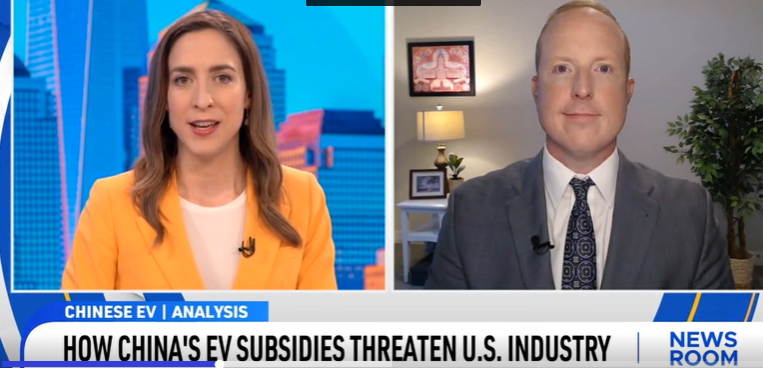

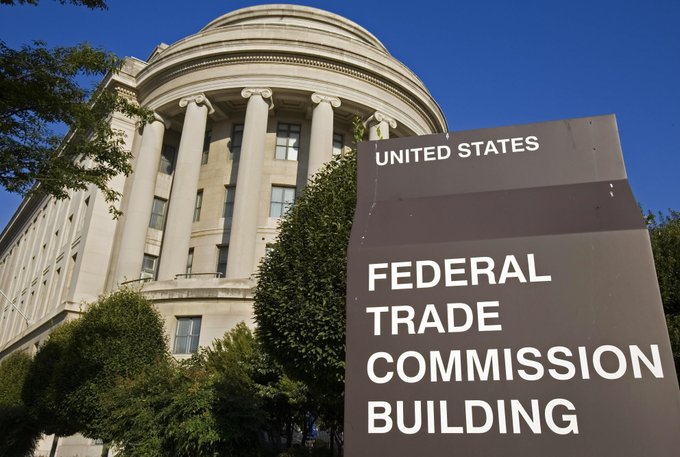
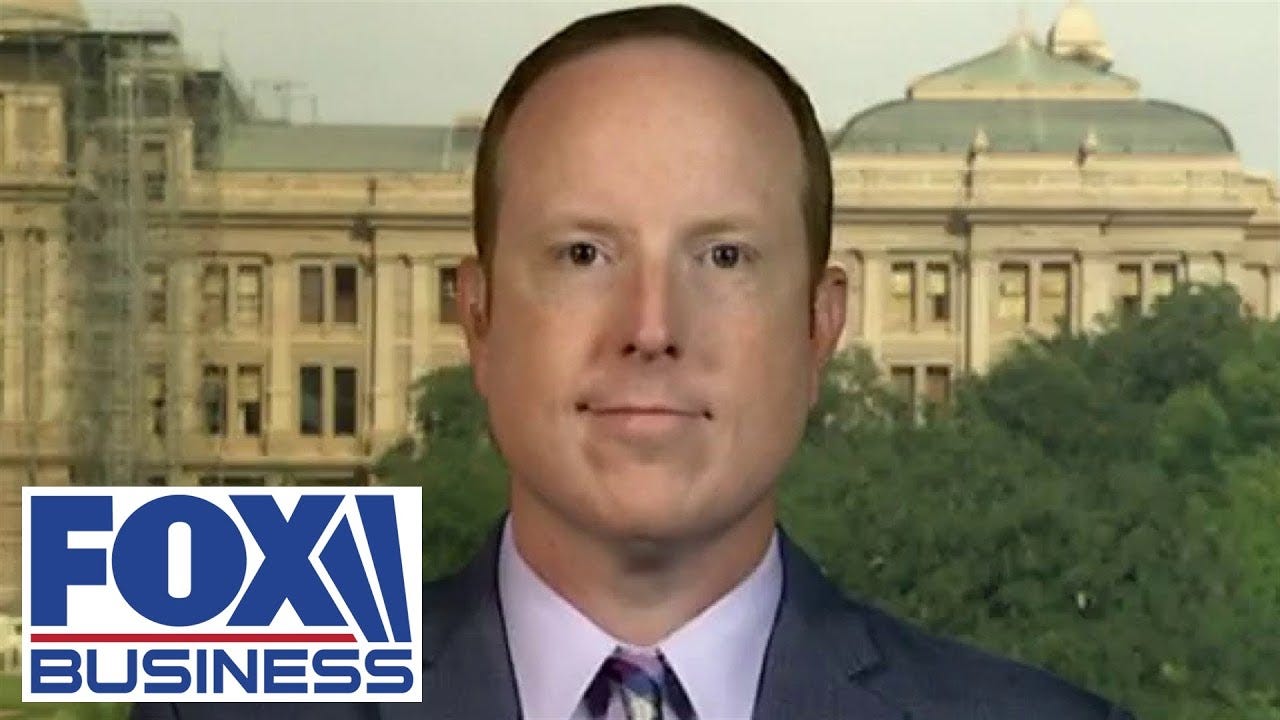
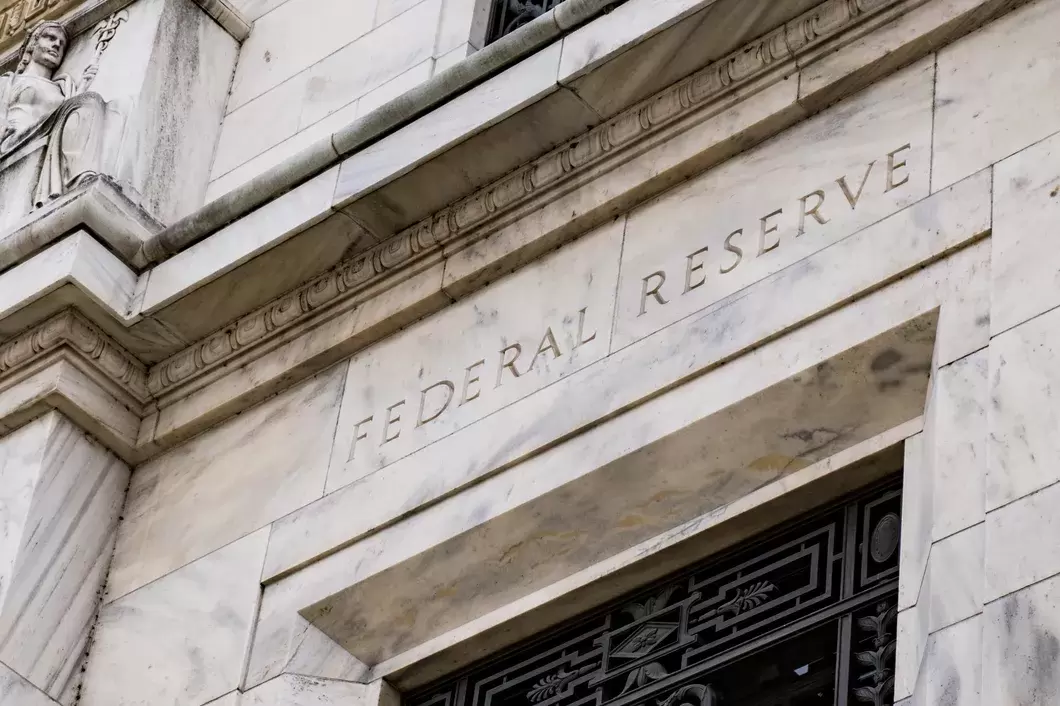
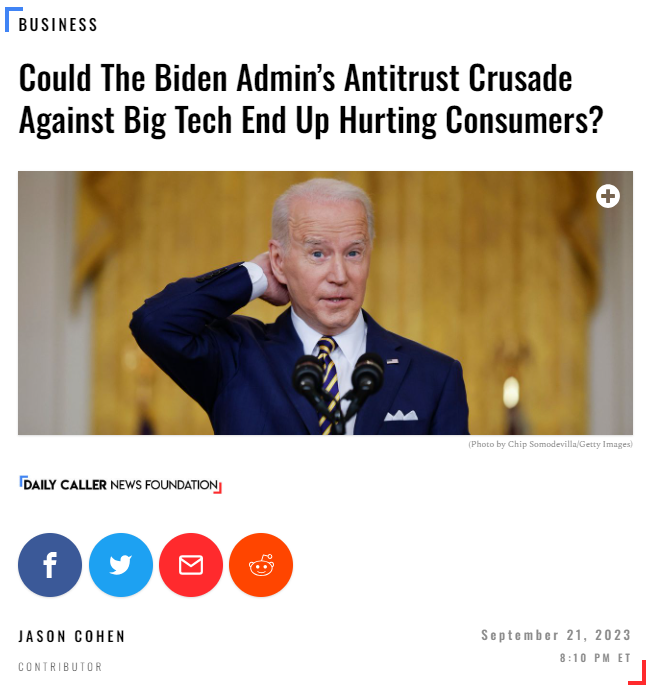
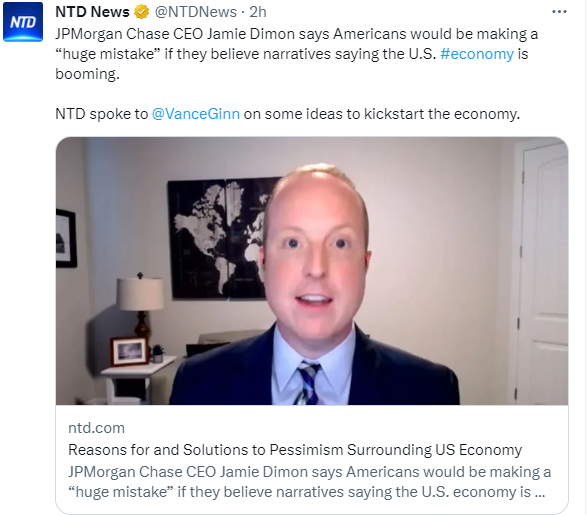

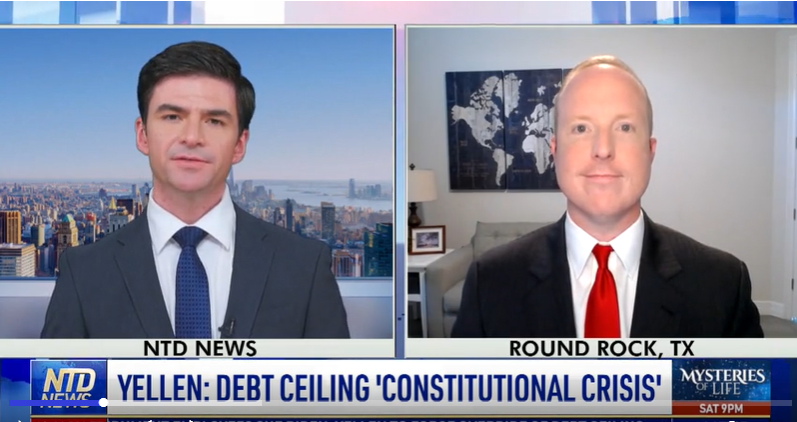

 RSS Feed
RSS Feed